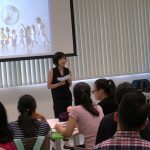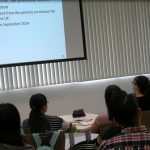Abstract
Increasingly around the world, children are required to learn foreign or second languages through primary school education. In this talk I begin by discussing some of the consequences of these policy decisions, and focus on the specific issue of crosslinguistic influence. Historically, researchers have examined the issue of crosslinguistic influence from the direction of the first language to the second (L1 –> L2). However, one of the consequences of lowering the age at which children are taught foreign/second languages is that it is likely their L1s are not fully developed at the time the L2 is introduced. This timing creates an opportunity for the L2 to influence aspects of the L1 (L2 –> L1). I discuss some of the research on crosslinguistic influence generally, and then present the findings of studies which show that L2 learning can influence key aspects of developing L1 skills, notably literacy. Learning a foreign/second language at primary school can, therefore, have much wider reaching consequences when introduced at younger ages in primary education contexts.
Speaker
Professor Victoria Murphy
Professor of Applied Linguistics, Department of Education, University of Oxford
About the Speaker
Professor Victoria Murphy is Professor of Applied Linguistics in the Department of Education, University of Oxford. She is the Course Coordinator of the MSc in Applied Linguistics/Second Language Acquisition and the convenor of the Applied Linguistics Research Group as well as the ‘Research in English as an Additional Language (REAL)’ research group. She has degrees in Linguistics, Psychology and also in Education, hence her work typically straddles these areas, with a focus on child L2/FL development, EAL children’s language and literacy development and early years EAL and FL learning. She has been published in a wide range of applied linguistics journals and is the author of ‘Second Language Learning in the Early School Years: Trends and Contexts’ published by the Oxford University Press and is lead editor of ‘Early Childhood Education in English for Speakers of Other Languages’ published by The British Council.
Date
19 July 2016 (Tuesday), 12:45 – 02:00pm
Location
Room 205, 2nd Floor, Runme Shaw Building , HKU
Chair
Dr. Yuen Yi Lo
- ‘Curses in TESOL’: Postcolonial Desires for Colonial English
- “Enhancing Data-Driven Learning in Disciplinary L2 English Contexts: Introducing CorpusMate”
- “Neither Bilingual nor Education”: critiques of bilingual education in state school education and responses to them
- A Two-Tiered Investigation Into the Dual Goal in EMI Education: Assessment and Instructional Practices
- Acculturation and digital trans-literacies in identity construction: An interdisciplinary perspective (Nov 6th, 2025)
- Appropriation of Resources by Bilingual Students for Self-regulated Learning of Science
- Auckland U – HKU Joint Webinar (28 November, 2024)
- Automated Content Feedback and Young English Learners’ Behaviours, Performances and Response
- Book Launch Seminar: Language Across the Curriculum & CLIL in English as an Additional Language (EAL) Contexts
- Critically Engaged Literacy Workshop as Decolonial and Anti-Racist Pedagogy (April 16th, 2025)
- Developing Language Educators’ Understanding of Assessment Reform Discourse and Practices: School-University Collaborative Action Research as Praxis
- Digital literacy pedagogy:
Key issues in the age of Gen-AI
- Digital Multimodal Composing for Specific Purposes: The Case of Sustainability Discourse
- EMI Symposium 2023: Fostering Collaboration
- Exploring Self-Regulated Use of Artificial Intelligence Tools in Language Learning
- Generative AI: Implications and Applications for Education
- Global Englishes-informed Teacher Education: Present Cases and Future Directions
- HKU-NCL Joint Webinar (Nov 27th, 2025)
- HKU-Newcastle U Joint Webinar: Critical Perspectives on Language Policy and Practice (May 2nd, 2025)
- HKU-NIE Joint Webinar: Designing Learning and Assessment with Multimodality in CLIL Classrooms
- Hong Kong SAR Government’s ‘Biliteracy and Trilingualism’ Policy: Sizing Up and Meeting the Challenge
- Hong Kong Students’ Self-regulated English Writing for Academic Studies
- HUMANISING TECHNOLOGY in Language Learning & Teaching
- Interactional Reflexivity in the Age of AI: Rethinking L2 Writing Teachers’ Assessment Literacy Development (Oct 9th, 2025)
- Language ideologies in text-based art of Xu Bing: Implications for language policy and planning
- Language Learning in 3D Virtual Worlds
- Learning about and using academic vocabulary: Critical issues for pedagogy (Feb 18, 2025)
- Motivational and Empowering Feedback in the Writing Classroom
- Multilingualism and its Ramifications
- Multilingualism and Mobility: The Semiotic Production of Centres and Peripheries in Airport Spaces
- Multilingualism and the Brain
- Narrative Skills in Mandarin- English Dual Language Immersion Learners
- Narratives of Cross-Cultural Understanding among South Asian Diasporic Students in Hong Kong
- NCL-HKU Joint Webinar (June 5th, 2025)
- Newcastle U-HKU Joint Webinar on Cultural Artifact Creation (14 November, 2024)
- Oklahoma U-HKU Joint Webinar (05 December, 2024)
- Optimising Classroom Learning: Speaking in and about Mathematics Classrooms
- People who come from state education are different”: How language use maintains social exclusion in Medical Education
- Policy vs Practice: Homework in Hong Kong EFL Classrooms
- Review of recent research on AI-powered technology in second language teaching, learning and testing (Feb 10, 2025)
- Revival and Threat: Language ideologies, policy, and nationalism in Kazakhstan and Mongolia
- Secondary school students’ source use in inquiry project-based learning (PjBL): Working towards avoiding plagiarism and engaging with sources
- Sociocultural awareness of international ELT policies: The case of a US-funded program in Morocco
- Studies of Public Policy Process and Implications for Research on Education Policy
- The Challenges of Teaching Non-Chinese Speaking Children to Learn Chinese at Kindergarten Level
- The Contributions of Growth Rates in Phonological and Spatial Abilities to Chinese Reading and Mathematical Competencies: A Longitudinal Study of Hong Kong Kindergarteners
- The Digital Literacies Forum 2023
- The Effects of the Medium of Instruction in Physics on Achievement and Motivation to Learn
- The Historical and Linguistic Background of South and Southeast Asian Multi-ethnic Communities in Hong Kong
- The Influence of Extramural Access to Host Culture Social Media on Ethnic Minority Students’ Motivation for Language Learning
- Top desk rejection reasons and how to avoid it
- Translanguaging in Everyday Textual Performances: Implications for Literacy and Pedagogy
- Understanding Language Learning Motivation in Hong Kong
- University of Melbourne – University of Hong Kong Joint Symposium (19 November, 2024)
- Using Reading to Learn Pedagogy to Support Non-Chinese Speaking Students Learning Chinese in Hong Kong
- Videos in language classrooms: A social semiotic perspective
- What can we learn from the Hong Kong Archive of Language Learning Project?
- New technologies in literacy research:
“Measuring” embodiment through
galvanic skin response
- Publishing in top-tier applied
linguistic journals:
Perspectives of an editor�reviewer-author




